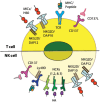Signaling in Effector Lymphocytes: Insights toward Safer Immunotherapy
- PMID: 27242783
- PMCID: PMC4863891
- DOI: 10.3389/fimmu.2016.00176
Signaling in Effector Lymphocytes: Insights toward Safer Immunotherapy
Abstract
Receptors on T and NK cells systematically propagate highly complex signaling cascades that direct immune effector functions, leading to protective immunity. While extensive studies have delineated hundreds of signaling events that take place upon receptor engagement, the precise molecular mechanism that differentially regulates the induction or repression of a unique effector function is yet to be fully defined. Such knowledge can potentiate the tailoring of signal transductions and transform cancer immunotherapies. Targeted manipulations of signaling cascades can augment one effector function such as antitumor cytotoxicity while contain the overt generation of pro-inflammatory cytokines that contribute to treatment-related toxicity such as "cytokine storm" and "cytokine-release syndrome" or lead to autoimmune diseases. Here, we summarize how individual signaling molecules or nodes may be optimally targeted to permit selective ablation of toxic immune side effects.
Keywords: NK and T cells; NKG2D; immunotherapy; signaling; target molecules.
Figures



References
-
- Sadelain M, Brentjens R, Riviere I. The basic principles of chimeric antigen receptor design. Cancer Discov (2013) 3:388–98.10.1158/2159-8290.CD-12-0548 - DOI - PMC - PubMed
Publication types
Grants and funding
LinkOut - more resources
Full Text Sources
Other Literature Sources

